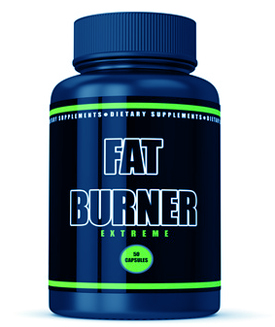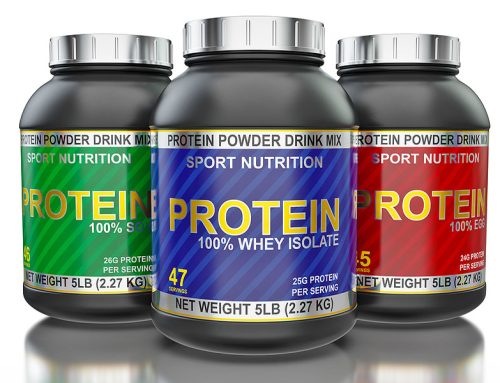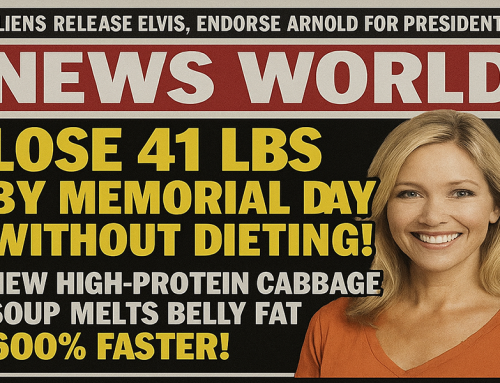The last time I bought a muscle magazine must have been 13 or 14 years ago. But I confess, the other day in the gym, there were three bodybuilding mags sitting on the bike, and I flipped through them as I was pedaling. As I saw the number of supplement ads and the outlandish things they said, it reminded me of one of the reasons I stopping buying magazines in the first place…

Smells like bovine excrement to me…
I don’t want to be completely critical of muscle mags – they inspired me as a young bodybuilder in the late 80s and 90s, and there were a few good articles in the ones I recently browsed.
But the average reader (especially the beginner) would not know the difference between the good info and the bad or the biased. Neither would they know how to sift through the ads to separate legitimate products from the scams.
The sad truth is, there are hardly any legitimate supplements in the muscle building and fat burning segments of the industry. There are rare exceptions, like creatine monohydrate, but the general rule holds true:
Buyer beware: Most bodybuilding supplements are BS!
A small handful of products may have benefits for exercise and sports performance or (less often) improved body composition, but the effects are rarely significant.
The weight loss segment of the supplement industry is even worse – it’s almost a complete farce – pure, unadulterated bovine excrement. It’s also worth remembering that in the past, products for increasing thermogenesis or pre-workout energy that did work were pulled off the market due to safety concerns (some of them actually contained drugs or harmful chemicals).
Most of the remaining supplements worth consideration don’t claim to build muscle or burn fat – they are for the purpose of general nutrition, convenience, and overall health (prevention of deficiencies due to certain dietary restrictions, and so on).
Here’s what makes the state of affairs today more embarrassing than ever: If you looked back at the last few decades, you would see a vast graveyard filled with supplements that never worked, made millions in sales before everyone figured it out, then fell off the map.
Memories are short, and young new customers continually enter the market. I would quote PT Barnum, but for the beginner immersed in bodybuilding and fitness culture, I’m sympathetic because it’s just not fair. Newbies have no experience yet and they are overwhelmingly lead to believe that you’re supposed to take supplements.
So the latest, greatest new product release cycle continues, and people keep wasting money and getting scammed, year after year, decade after decade.
As I was flipping through those muscle magazines during my cardio session the other day, I snapped some pictures of the supplement ads so I’d remember the headlines and could blog about them when I got home.
Some of these ads made claims so ridiculous I actually started laughing, but I hope my commentary is taken seriously – this is a cautionary tale…
Ridiculous ad #1: “I’m always the first to try new supplements… now you can too!”
The bodybuilding supplement industry has an abysmal track record.
Boron, dibencozide, vandyl sulfate, gamma oryzanol, beta sitosterol, OKG, chromium picolinate, glandulars, bee pollen, Smilax, Inosine, and that’s just a tiny sampling of old-school supplements that were all the rage back in the early days.
Many people jumped on the chance to try these when they were first promoted in the magazines. I think it’s an innate human tendency to be attracted to what’s new (novelty). It can reward us at times, but also be our biggest downfall. Some of these products were huge sellers back then, but where are they now? Seriously, why aren’t you on Boron?
Consumables aren’t ipods or iphones. Being an early adopter of technology might be expensive and there may be bugs, but the odds of finding a convenience or life-enhancing tool aren’t that bad. Being an early adopter of supplements on the other hand, the odds are 99 to 1 you’re being scammed and you may be risking your health.
Nearly everyone wants the freedom to buy and use any supplement they want, but this comes at a cost. Supplements are not regulated like drugs. Companies can release them fast without approval and don’t have to take them off the market until the adverse effect complaints start coming in. “Safe until proven dangerous” is not always a good assumption.
When you put together safety concerns and the dismal track record, that’s why “be the first to try new supplements” is the worst advice ever dished out!
More sensible advice: be the last person to try a new supplement. If you use supplements at all, use supplements that have been thoroughly researched for years for effectiveness and safety.
Even better, take a pass on “muscle building” and “fat burning” supplements completely – most don’t work, and the few that do are lowest on the hierarchy of what’s really important.
Ridiculous ad #2: “I want a supplement company to tell me the truth.”
Good luck finding one! Here’s a cold, hard dose of reality: If a “fat burner” or “muscle builder” advertisement sells a product really well, it’s almost axiomatic that it contains lies or even violates a Federal Trade Commission (FTC) law. The promises you see in the most successful weight loss ads are like a word for word transcript of the FTC red flag list for false weight loss claims.
Most “fat burners” don’t work at all – they are complete scams. On the rare occasion a well-done study detects a benefit, it’s invariably tiny – barely reaching statistical significance.
Imagine if research results were reported honestly, like “Clinically proven to burn 0.16 kilos more fat per month” who would buy that? Tame claims don’t sell. It takes bold, outrageous promises to sell supplements. That’s why the ads are epitomized by hyperbole, exaggeration and often, outright lies.
Supplement advertising also depends on (paid) endorsements and testimonials – which is pure anecdote, not evidence. And how honest is it when an athlete endorses a natural supplement, yet their physique was built with a cocktail of performance-enhancing drugs?
Ridiculous ad #3: “The most powerful clinically-studied muscle-building stack: This isn’t creatine, HMB or protein – it’s far more powerful than any of these supplements.”
This ad uses the common trick of calling the product a “stack.” Let me explain what that means: It’s no secret that many professional bodybuilders use anabolic steroids. What most people don’t know is that they typically use multiple drugs, including different steroids and other chemicals with different purposes. When numerous drugs are taken at once, it’s referred to as a “stack.”
This term, stack, is used in bodybuilding supplements when more than one ingredient is included. The trouble is, using the word stack implies a similarity to drugs, or at least the advertisers hope a subconscious connection is made in the mind of the consumer.
Also, some ridiculous comparisons are made here. So far, there aren’t any bodybuilding supplements that are more effective than creatine. Ironically, even creatine is not so “powerful” – it won’t make or break you, and not everyone even responds to it.
Protein supplements can be convenient and helpful, but I wouldn’t describe protein as a “powerful supplement,” and I wouldn’t even say “it works.” It’s just food. Would you say, “Chicken breast is powerful” or ask, “Does tuna fish work?” It sounds strange to phrase it like that because chicken and tuna are just foods. However, if you put powdered food into a tub, suddenly it can be advertised as having magical properties.
And HMB, well that’s practically a joke in bodybuilding circles. It’s one of those supplements that keeps getting debunked, but keeps trying to come back. HMB is like a turd that won’t flush. A recent study helped HMB make the rounds again because it suggested dramatic muscle gains were made in trained subjects. The study was later picked apart by more than a dozen fellow scientists who questioned both research methods and potential conflicts of interest.
The latest meta-analysis (which looked at all studies to date) found no effect of HMB supplementation on strength and body composition in trained and competitive athletes: https://www.sciencedirect.com/science/article/pii/S1440244017317590
Ridiculous ad #4: “It’s like testosterone on testosterone! Mimics the stacks used by the pros! Increases your natural production of testosterone! Total hormonal manipulation!”
First of all, there we go with the “stack” trick again. Notice that? Comparing a supplement to the drug stack of professional bodybuilders? Ridiculous!
The claims in this ad continued, “Triggers the release of testosterone, helping to promote explosive strength and head-turning gains in rock-hard muscle mass,” and of course further down on the page, they couldn’t resist claiming, “Increases sex drive and performance.”
Here’s news for young men: Unless you have a medical problem, you have plenty of testosterone surging through your body – you don’t need to supplement that natural production in any way.
More news to men of all ages: This entire category of “muscle building” supplements is another total farce. I have never seen any convincing scientific evidence that any over the counter supplements boost testosterone or increase muscle growth over time.
True low testosterone (“hypogonadism”) is a medical issue. If you suspect problems, go to your doctor, not your local supplement store.
Dr. Spencer Nadolsky is an MD, known as “the doctor who lifts.” One of his specialties is hormones. Dr. Nadolsky wrote a great editorial on this subject titled, “Quit worrying about your testosterone.” He said:
“Testosterone boosting supplements are BS. Metabolic syndrome (big waist circumferences and insulin resistance) and HPA Axis Dysfunction (mistakenly called Adrenal Fatigue) are two things you can work on to increase your natural T levels if you have these things. Other than getting leaner and meaner with great sleep and stress reduction, there isn’t much else – and you know what? That is just fine because you can get big and buff without the high normal testosterone levels. There are multiple mechanisms of muscle growth (hypertrophy), so to focus on testosterone only is silly.”
Ridiculous ad #5: “No prescription required!”
No kidding! It’s an over the counter supplement, not a drug!
Still, you see this ploy in supplement ads all the time because it plays on people’s desire to not visit a doctor or to find “natural” alternatives to drugs.
Building muscle or burning fat the natural way (drug free) is something I commend and recommend – but it’s done through training, nutrition and a healthy lifestyle, not with pills and powders. And drugs are for losers.
Ridiculous ad #6: “300% Greater Muscle Gains! 200% Greater Fat Loss!”
Suppose a supplement has evidence supporting a small muscle building or weight training performance benefit. What usually happens is someone in the advertising department goes through a study and pulls out some numbers to manipulate. It’s easy to do. A fractional improvement in lifting performance or lean body mass, depending on how the data is parsed, can easily become “double or triple the gains.”
One advertisement claimed that a fat burner pill caused twice as much fat loss, based on scientific research. What they conveniently forgot to tell you was that after six months, the fat burner group only lost 1 kilo. Whoop de doo! One kilo after buying a six month supply of this “miracle” fat burner. If you can only lose 1 kilo in six months, maybe you’d better fix your diet.
Sometimes important details get reported inaccurately or innocently lost in translation, but there is almost always something shady going on when you see these gigantic percentage gains. There’s an old book called, “How to Lie With Statistics” and I’ve always had a suspicion that it’s a bible in supplement company ad departments.
Ridiculous ad #7: “The weight loss stimulating agent that has freakish effects on both fatty deposits and lean muscle mass. It is a remarkable body shaping tool that must be used carefully. Do not even consider trying this product until you fully understand its strength.”
The idea that a legal, over the counter fat loss supplement is so strong that it has to be used with caution is another ploy that lures people into buying. It also allows companies to get away with charging premium prices, like what prescription drugs cost, even though it’s a nutritional supplement, not a drug.
And since when has a pill ever been recognized as a “remarkable body shaping tool?” Pills are not a body shaping tool! Barbells and dumbbells are a body shaping tool!
I’m shocked that anyone still even buys “fat burner” pills considering how many scams and frauds have been openly exposed for so many years (especially when they’re sold with ludicrous hyperbole like this ad headline – how do you stop yourself from breaking into laughter after reading that?)
With the internet today, there’s no excuse for failing to investigate before you invest. It’s easier than ever today to look up the science, and it’s not that hard to find trustworthy, evidence-based, independent fitness pros who will review the research for you. They’ll all tell you the same thing:
The entire “fat burner” supplement category is virtually 100% bogus.
Here’s another way to look at it: If the pharmaceutical companies can’t even come up with a decent weight loss drug (that proves over time to be both effective and *safe*), what makes anyone think supplement companies can?
Ridiculous ad #8: “BCAAs! Enhance muscle building, speed recovery, increase fat burning! Backed by university studies.”
Some feathers are going to get ruffled here, but the truth is, the darling supplement of the last decade is rapidly being debunked by all the latest science.
It’s not that branched chain amino acids (BCAAs) aren’t important – they are critical. What most people keeping forgetting (thanks to all the advertising hype), is that BCAAs are found in your protein foods. In a proper diet that contains adequate amounts of protein, any advantages of taking BCAAs as supplements that were found in said “university studies” diminish or disappear.
In the most recent study, the researchers confirmed that BCAA activates pathways that increase protein synthesis in the muscle fibers. But in the same sentence (often left out of the supplement ads), they also said,
“BCAAs alone may not be the optimal nutritional regimen to stimulate a maximal muscle protein synthesis response to resistance training exercise.”
In an even more shocking reversal, there may actually be negative effects of taking BCAAs in isolation, instead of with all the other essential amino acids. In a research paper out of McMaster University, the authors wrote:
“Despite the popularity of BCAA supplements, we find shockingly little evidence for their efficacy in promoting muscle protein synthesis of lean mass gains and would advise the use of intact proteins as opposed to a purified combination of BCAA that appear to antagonize each other in terms of transport both into circulation and likely into the muscle.”
You don’t need BCAA supplements when you’re already getting enough high quality protein from whole food sources. If you really want to use a protein supplement, consider instead a powder like whey that contains high amounts of BCAA, along with all the other essential amino acids as well.
Caution!
Not much has changed in the past 30 years. The promises and assertions made by bodybuilding supplement ads are still as ridiculous as ever.
Yeah, there’s a (small) handful of supplements you might find useful. But to build muscle and lose fat, you don’t have to take any supplements whatsoever if you don’t want to and you don’t need drugs either. Believe me, you can get in spectacular shape without “taking something.”
Seeing this kind of BS continue for so many years, has at times made me feel like taking early retirement and getting a long way away from the bodybuilding and weight loss industry. But if I stop, the bad guys win, so this has only strengthened my commitment to redouble my efforts as a writer, educator and coach.
You’ll be hearing from me a lot more in the near future. Check back every Thursday for a new post here at Burn the Fat Blog.
To learn more about an all-natural approach to building muscle and burning fat that requires or promotes no supplements whatsoever, check out Burn The Fat, Feed the Muscle, which is now available in both hardcover and the top-selling audiobook (Audible) edition.
– Tom Venuto,
Author of Burn The Fat, Feed the Muscle.
Founder & CEO, Burn The Fat Inner Circle

Tom Venuto is a lifetime natural (steroid-free) bodybuilder, fitness writer and author of Burn The Fat, Feed The Muscle: Fat Burning Secrets of Bodybuilders and Fitness Models and the national bestseller, The Body Fat Solution, which was an Oprah Magazine and Men’s Fitness Magazine pick. Tom has appeared in The New York Times, Wall Street Journal, Huffington Post, Oprah Magazine, Muscle and Fitness Magazine, Ironman Magazine and Men’s Fitness Magazine, as well as on dozens of radio shows including Sirius Satellite Radio, ESPN-1250 and WCBS. Tom is also the founder and CEO of Burn The Fat Inner Circle – a fitness support community for inspiration and transformation






This is awesome Tom thank you for your insight. Many of the MLM companies today are hopping on this bandwagon and pushing the same garbage you see in the ads but it’s almost worse because you can make a fortune by pedaling this stuff to folks who haven’t done the research and really don’t know any better. They should read this blog post!
Very true David, lots of bogus products being sold in those businesses and also marked up even higher in price!
Does this include ALL supplements? Nutritional supplements? I do not take any to build muscle, loose fat. I do take some because I lack vitamins and minerals from foods, due to not eating enough veggies and fruits. Wondering if these too are BS.
Interested in your thoughts
Sandee – no. This post is referring to bodybuilding / muscle-building and fat burning supplements, where almost all the products are bogus or so minimally effective as to be not worth it. There are a handful of supplements in the general health and nutrition category that certainly have benefits for some people (i.e., avoiding nutrient deficiencies due to dietary restrictions and so on)
Hi Tom,
I have a question regarding ketosis. I was attending a craft fair and a table there called “Pruvit” claim to fame is to have you in Ketosis in 59 minutes. The 2 women at this table said it’s like “Bio-hacking” I was beyond skeptical, not to mention this stuff is ridiculously expensive. Can you elaborate on the whole Ketosis phenomena that seems to be in the forefront? I have googled it a bit, but you’d be able to put it into terms I can wrap my head around I’m sure.
Thank you
Dani
Hi danielle. Exogenous ketone supplements are another scam. Ketogenic diets are not (though they are not where I would recommend anyone start on their fitness and health journey, unless they have a very good reason to and an extensive understanding of why the low carb, high-fat diets / LCHF work). There is no “magic” to ketogenic diets, its just a resurfacing of an old trend that has been around for decades. I recommend avoiding keto if your only reason for interest is the its the hot trend of the month. I see Keto or other LCHF diets as a tool for specific people with specific circumstances and unique problems. For most people there is no benefit of keto over any other more balanced (less restrictive) weight loss diet. Ive written about both exogenous ketone supplement scam and a Ketogenic diet FAQ and position statement for our members at Burn the Fat Inner Circle just last week.) Keep up that healthy skepticism – it will save you a lot of money, time and possibly your health and mental well being.